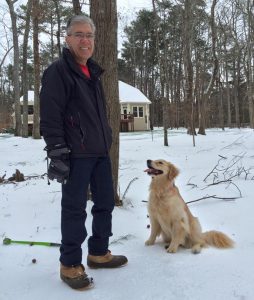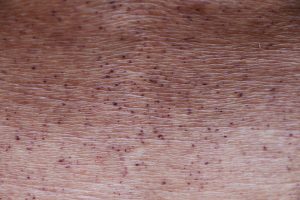Fabry Disease: A Road Less Traveled
Written by |

For my introductory Fabry Disease News column, I’d like to share a little about me and my journey with Fabry disease. Just over 40 years ago, in 1979, Fabry disease was discovered in my family. My mother was diagnosed with an eye exam when she was hospitalized for an unrelated medical issue. Her eyes were bulging out, which is not a known symptom of Fabry disease. Her peculiar eye issue triggered an evaluation and the detection of corneal whorls, medically known as cornea verticillata. This is a common sign of Fabry disease that can be seen in a routine slit lamp exam. According to medical reports, corneal whorls do not usually affect vision but they are very helpful in diagnosing our disease.
At that time, I was serving in the U.S. Air Force in the Netherlands, within a year of being discharged to return to the U.S. When Fabry disease, an inherited disorder, was discovered in my mother, many of my immediate and extended family members were tested. To date, 24 family members have been diagnosed and at least 18 have not yet been tested.
Although I did not get tested while I was abroad, I did enough research to know I was affected. Angiokeratomas — small, dark spots on the skin caused by dilated capillaries — are another common sign of Fabry disease. These were abundantly present on my body. And so began my journey with this rare genetic disorder on what I have dubbed “a road less traveled.”
Thankfully, my journey has lasted much longer than I ever expected and it continues with the hope of many years still ahead of me, despite the occasional difficulties. At the time of my mother’s diagnosis, the average life expectancy for an untreated male was only 41 years old.
As you might imagine, the news of my disease was quite a shock and caused me many days of stress and worry. After all, there was no treatment or cure in sight. That fateful statistic about premature death often preoccupied my thoughts. As hard as I tried to keep it out of my mind, I thought about it almost every day. I thought I might have only had 16 years left to live!
I decided to pack in as much life as possible into the relatively few years I thought I had left. My goals changed from long-term to short-term. Instead of delaying adventurous activities I thought I might do someday, I accelerated my timeline.
I learned to skydive, scuba dive, and snow ski. Flying in gliders while living in England, flying in a hot air balloon over the Masai Mara game reserve in Kenya, and scuba diving in the Red Sea while working in Saudi Arabia became unforgettable checks off my bucket list. Learning to snow ski in Germany’s Garmisch-Partenkirchen and skiing down the Zugspitze, Germany’s highest mountain, at the end of my beginner ski week program was incredible! In addition to my adventurous activities, I traveled to as many countries as I could to see the sights, meet people of other nationalities, and experience other cultures.
As days, months, then years passed by, the statistics about the predicted longevity of people like me changed. Over time, with dialysis and kidney transplants, the average age of death for untreated males changed to 50 in medical literature. As treatments became available in 2003 in the U.S. and earlier in Europe, the average age of death rose to 58. While I have had several life-threatening experiences, I am fortunate to continue to have birthdays.
One of the keys to living a happy, fulfilling life has been to find alternative activities each time I have to give something up because of my disease. Much of my complicated, yet full life has been altered somewhat by disease-related limitations. Now, at 65 years old, with progressive heart disease, kidney disease, lung disease, profound hearing loss as well as many other symptoms caused by Fabry disease, my choices of activities are fewer than ever. One of my mottos I share with others is: “If you cannot do something you want to do, find an alternative activity that fulfills your needs. Don’t give up!”
Sadly, there are many people with Fabry disease who have very difficult lives and many who succumb to it prematurely, including five of my family members who died between 37 and 51 years old. With continued research, earlier diagnoses, and improved treatments, we continue to have great hope for better and longer lives!
***
Note: Fabry Disease News is strictly a news and information website about the disease. It does not provide medical advice, diagnosis, or treatment. This content is not intended to be a substitute for professional medical advice, diagnosis, or treatment. Always seek the advice of your physician or other qualified health provider with any questions you may have regarding a medical condition. Never disregard professional medical advice or delay in seeking it because of something you have read on this website. The opinions expressed in this column are not those of Fabry Disease News or its parent company, Bionews Services, and are intended to spark discussion about issues pertaining to Fabry disease.








Kim Michael
Thank you for sharing your story, I hope it will help people get a diagnosis of our disease rather then feeling helpless.
Jerry Walter
Thank you Kim! Jerry
Brian Hunter
Hi Jerry,your story your strength and all the work you do for the Fabry community is an insparation to me. Keep on rockin!
Brian Southport.
Jerry Walter
Thank you, Brian!
Hp
Jerry, thank you for this. My son was diagnosed today- 9 month old little boy. I have been reading non-stop. Your story is inspiring and will help me get alittle sleep. Thank you and be well/be safe
Jerry Walter
Thank you Hp. Feel free to contact me at [email protected]. Jerry
Betty Gibson
Jerry, although I am familiar with your story and the struggles as well as the triumphs, our family (especially Angela) are so very blessed to know and love you and have the utmost respect for your passion as you share about Fabry! We join you in living with hope and the ongoing research that will produce treatments needed that will provide a better way of life for each one. May God bless your efforts! Thank you again, Betty Gibson
Jerry Walter
Thank you, Betty!
Glynis Bakker
Thank you very much Jerry for your story and for posting me the latest National Fabry Disease Foundation newsletter to the UK. It’s the first time I have access the website and find it very informative. Wishing all the very best. Glynis
Jerry Walter
Thank you, Glynis! Jerry
Brian Hunter
Hi Jerry,your story your strength and all the work you do for the Fabry community is an insparation to me. Keep on rockin!
Brian Southport.
Jerry Walter
Thank you, Brian! Jerry